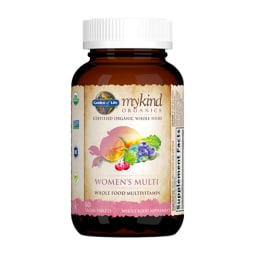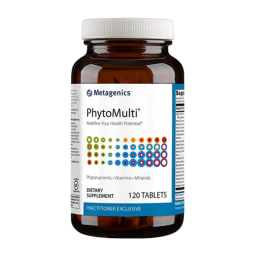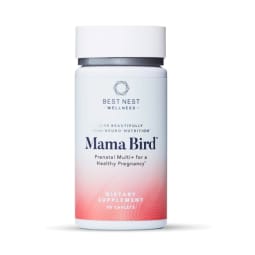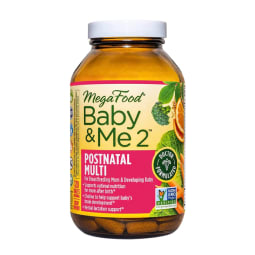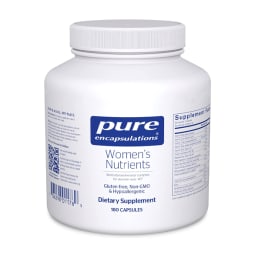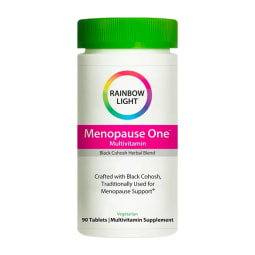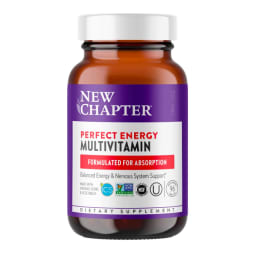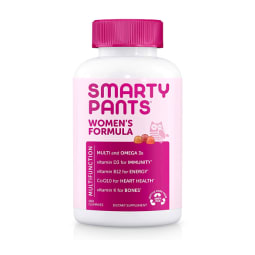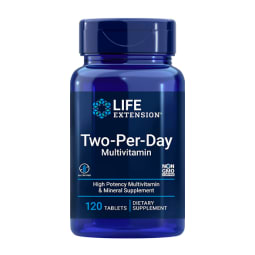Even the most balanced diets can still require a little added assistance to fill in nutrient gaps. And now, with plenty of evidence on the benefits of a targeted multivitamin for whole-body health, there’s really no reason not to be taking one. Men and women have similar (often identical) vitamin and mineral (i.e., micronutritional) daily requirements. And at mbg, we really believe in gender-neutral multivitamins thoughtfully formulated to strategically cover both sets of needs. There is, however, an exception for women who are pregnant, trying to get pregnant, or breastfeeding, who require higher amounts of certain key nutrients. With this in mind, we rounded up up the 10 best multivitamins for women at every stage of life—all of which feature high-quality ingredients, clean delivery formats, and rigorous standards. With that being said, both men and women will often benefit from taking the same multivitamin—as long as it’s complete, which we’ll get to later. The one time women will want to opt for a gendered multivitamin is if they’re looking for support around pregnancy. “A specialized multivitamin, for example for prenatal support in women trying to get pregnant or who are pregnant, should feature higher levels of key nutrients, particularly iron, calcium, vitamin D3, iodine, and certain B vitamins (e.g., folic acid), on top of the baseline full array of vitamins and minerals in a regular multi,” explains mbg’s vice president of scientific affairs Ashley Jordan Ferira, Ph.D., RDN. Moral of the story: Most people needn’t fret about finding the best multi for women. Instead, just focus on finding the best multi, period. Containing a higher dose of iron (18 mg) to support pregnancy daily needs (27 mg), this supplement also has a unique blend of probiotics, digestive enzymes, and organic herbs (including organic chamomile flower and ginger root) for belly comfort. Organic and vegan, this multi is free of the things your baby doesn’t need, like sugar, preservatives, artificial color and flavors.* A complete multivitamin will fill common nutrient gaps1 with an array of essential vitamins; provide microminerals like iron, zinc, iodine, selenium, copper, manganese, molybdenum, and chromium (we all have daily needs for these too, mind you); and ideally have some nonessential—but supportive—trace minerals like boron and silica. Added botanicals and bioactives are a major bonus, too. Your personal eating habits will guide which multi is best for you. If you follow a vegetarian or vegan diet, be sure to choose one that contains a complete B vitamin complex with all 8 essential B vitamins. Iron and iodine are also key for plant-based eaters. Another point to consider is ingredient dosage. There’s no point in investing in a supplement that only supplies your body with a sprinkle of vitamins and minerals. Look for high-potency formulas that offer a full array of vitamins and minerals, at or above 100% of the daily recommended value. Just note that some of the larger minerals (calcium, magnesium, and potassium) are more difficult to squeeze into a capsule, so they’re often included in slightly lower doses to keep serving sizes down. As for packaging? “I am a strong proponent of packaging that’s recyclable, doesn’t introduce more plastic into our planet, and also protects the precious ingredients you’re paying for,” Ferira previously recommended. “For that combination of environmental impact and buffering your multi ingredients from UV light, amber glass fits the bill,” she adds. Finally, you’ll want your multivitamin to adhere to your personal values. If you’re already prioritizing a diet that’s vegan and free of GMOs, artificial sweeteners, and synthetic dyes, why not look for the same in your daily multi? “A high-quality and comprehensive multivitamin/mineral supplement supports a variety of structures and functions in our body, like our bones, immune system, eyes and vision, cellular energy, and more, because the array of vitamins and minerals (and unique botanical ingredients, if included) all play critical roles in cells, tissues, and organs throughout our beautifully complex bodies,” Ferira previously noted. Although, again, gendered multivitamins may not be necessary for everybody, if you have pre- or postnatal needs, a female-targeted multi will be a good choice.











